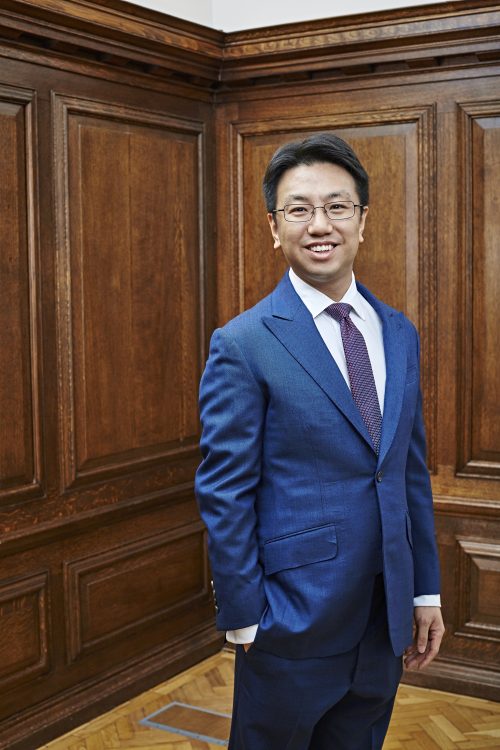By Tsering Namgyal
Elwood Asset Management, owned by hedge fund billionnaire Alan Howard, is a boutique fund management house specializing in blockchain equity funds, allowing investors to gain exposure to blockchain assets without touching cryptocurrencies. In partnership with Invesco, it recently rolled out its second blockchain equity fund, a domestic mutual fund in Japan that tracks its unique Elwood Global Blockchain Equity Index. We speak to CEO Bin Ren on the firm’s mission and its future expansion plans.
Q1: Tell us a bit about Elwood’s mission and investment philosophy? How it was envisioned and some of your main backers?
A: Elwood is an investment firm that specialises in digital assets. Our mission is to create breakthrough products that allow global investors to participate in the growth of the digital asset ecosystem.
Q2: Could you please takes us through your three-layered digital asset stack model?
A: We describe the digital asset ecosystem using a term called the “digital asset stack”, which consists of 3 layers. The bottom is the foundational layer that represents blockchain technologies. The middle layer is capital markets which include the primary and secondary markets for spot, derivative and fixed-income instruments. The top layer is the digital assets themselves.
The Elwood Blockchain Global Equity Index, which is calculated by Solactive AG, offers investors exposure to the bottom layer, i.e. the growth of blockchain technologies. It embodies our philosophy of delivering innovative investment thesis in a familiar format.
Q3: Elwood has partnered with Invesco to offer equity funds in the and now in Japan? Please tell us more about your funds?
A: The Invesco Global Blockchain Equity Fund is a Japanese domestic mutual fund that tracks the Elwood Blockchain Global Equity Index (for more on Elwood’s Japan blockchain equity fund see here). The index, which is rebalanced quarterly, has a unique methodology behind it which assesses companies based on the percentage of corporate value attributable to blockchain technology and categorises them into five buckets: Core, Significant, Moderate, Developing and Potential. This ranges from companies for whom blockchain already comprises a significant part of its value, to companies who do not conduct any blockchain-related businesses currently but who are well-positioned to capitalise on the technology. Because blockchain technology is still in its early stages of development, much of the index is focused around the Developing and Potential categories currently. However, over time we expect this to evolve and be more weighted to the moderate to significant categories as adoption of blockchain continues to grow.
Q4: Please explain the constituents of the Elwood Global Blockchain Equity Index? Are their many other similar benchmarks around the world for blockchain equity funds?
A: Our index is unique in terms of its diversification on both a sector and geography basis. There are other benchmarks that track companies with exposure to blockchain, but these predominantly focus on Tech companies in the US. Our index is truly global – comprising of around 40% in the US, 30% in Japan, and the remainder spread across countries across Asia, Europe and the Middle East. In terms of sector split, although the index still has a significant allocation to Tech firms (over 40%), it also has nearly 30% is in Financials and almost 10% in each of Communication Services, Consumer and Materials. Health Care and Utilities also feature.
Q5: Who are you planning to target mainly with these blockchain equity funds/your main primary client base? What sort of return they are looking at?
A: These products target investors with an equity mandate. The investment thesis is that blockchain-related impact on corporate earnings is currently underappreciated and not priced in by the market. If the blockchain technology continues to develop and its applications continue to emerge, the positive earnings surprise will result in outperformance vs a global diversified equity benchmark such as MSCI World. If the blockchain technology fails to live up to its promise, investors still end up holding a diversified equity portfolio that tracks the MSCI World. The asymmetric payoff profile is the main thesis.
Q6: Finally your thoughts on the future of blockchain technology? Your plans, if any, to roll out such funds in any other jurisdictions in Asia?
A: Blockchain technology is a transformative technology that solves the “trust issue” on a global scale. Currently when multiple parties have to interact without mutual trust, the costs of authentication, validation, audit, bookkeeping are very high. In these cases, blockchain technology can reduce the costs while increasing the number of participants by several magnitudes on a global scale. These participants can be humans, companies or machines.
Blockchain technology fits well with other technologies such as self-driving cars, IoT, AI and 5G. Together they create a future where information is shared and utilised with efficiency, transparency and privacy. At Elwood we always look to provide global investors access to this emerging ecosystem. Asia is a big focus for us.
